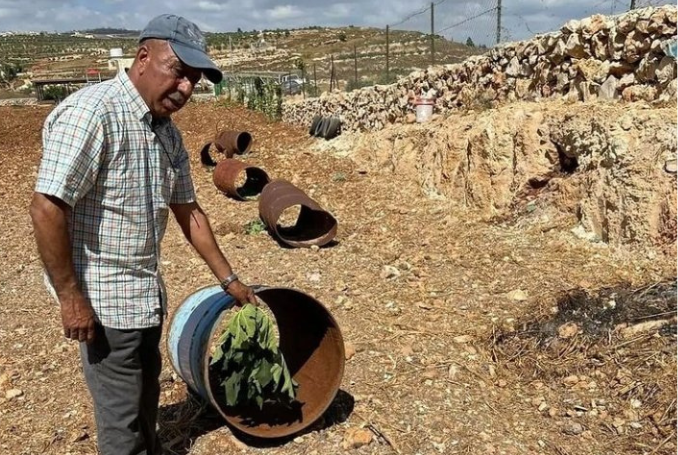
In a year marked by environmental devastation, Israeli forces and settlers have uprooted tens of thousands of trees and confiscated large swaths of Palestinian land in the West Bank, exacerbating the broader environmental crisis that is also unfolding in Gaza.
In 2024, the Israeli army and settlers caused significant environmental damage in the occupied West Bank, uprooting more than 59,000 trees and seizing approximately 50,000 dunums of Palestinian land, Anadolu reported, citing a just-published report.
According to a recent report from the Land Research Center (LRC), a Palestinian research organization based in Jerusalem, this year has seen a marked escalation in settler violence and land confiscation, which the center describes as “settler madness and land hemorrhage.”
The report details that over 59,000 trees have been uprooted or destroyed by Israeli forces and settlers in the West Bank, with 52,373 trees completely eradicated. These losses are especially critical due to the centrality of olive trees to Palestinian agriculture and cultural identity.
Record-High Settler Violence: Nearly Four Incidents Daily in West Bank in 2024
The report also notes that Israeli authorities have seized vast tracts of Palestinian land throughout 2024, further diminishing the already shrinking areas of land available to Palestinian farmers. A total of 50,000 dunums of land — an area roughly the size of 50 square kilometers — has been confiscated by Israel, displacing Palestinian communities and restricting their access to essential resources.
In a related incident in Masafer Yatta, south of Hebron, Israeli settlers targeted local Palestinian Bedouin communities by destroying olive trees and chasing Palestinian shepherds from their grazing lands, Anadolu reported.
Hasan Melihat, the general supervisor of the Bieder Organization (a group defending the rights of Bedouin and rural Palestinian villages), reported that settlers unleashed their livestock onto Palestinian farmland, causing further destruction to olive groves and deepening the economic hardship faced by local Palestinians.
This destructive pattern is part of Israel’s broader strategy to expand its illegal settlements in the occupied West Bank. Settler violence and the continuous land seizures not only impact Palestinian agriculture but also threaten the fabric of Palestinian society by limiting their ability to cultivate the land that has sustained them for generations.
The Israeli Settlers and Their Stones – The Daily Journey of Palestinian Students in West Bank
These actions come amid a growing environmental crisis across Palestine, particularly in Gaza, where Israel’s military operations have resulted in unprecedented ecological damage. The United Nations Environment Programme (UNEP) released a preliminary assessment in June 2024, documenting the severe environmental impacts of the conflict on Gaza’s soil, water, and air.
Gaza’s already strained infrastructure has collapsed under the weight of relentless bombing and military activity. The assessment revealed that sewage treatment plants are nonfunctional, resulting in the contamination of freshwater sources and coastal waters. This pollution has created immediate public health risks, and the long-term environmental consequences are yet to be fully understood.
In Gaza, the destruction of vital infrastructure — including water desalination plants, wastewater treatment facilities, and electricity grids — has compounded the difficulties faced by residents. The UNEP report estimates that more than 39 million tonnes of debris have accumulated as a result of the Israeli war, much of it containing hazardous materials such as unexploded ordnance, asbestos, and industrial waste. This debris presents serious risks to both human health and the environment, with long-term effects expected to persist for years.
Cutting Down Olive Trees – Israel’s Way to Steal Palestinian Land
Moreover, the destruction of solar panels in Gaza — previously a critical source of energy — poses another environmental risk. The breakdown of these panels is expected to release lead and other heavy metals into the soil, further contributing to soil and water contamination. These environmental hazards, combined with the continued destruction of agricultural land, undermine Gaza’s already fragile ability to support its population.
The environmental destruction in Gaza and the West Bank is not a separate issue but rather part of a broader strategy of territorial control and dispossession, rights groups say, arguing that, in both regions, Palestinian communities are being systematically deprived of their land, resources, and ability to sustain themselves.
(PC, Anadolu)
